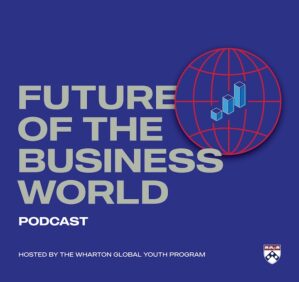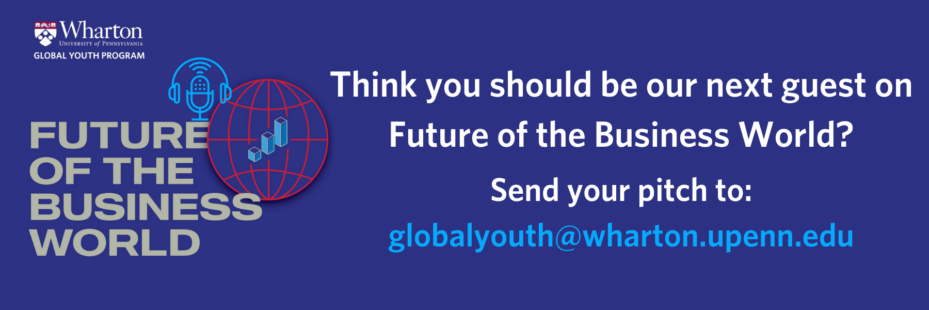Future of the Business World: Cabbage Rolls, Resilience and Our Place As Global Citizens


On this month’s podcast episode, we meet Jasa Oliver, a junior at Leechburg Area High School In Pennsylvania, U.S. At the start of the war between Russia and Ukraine in February 2022, Jasa felt compelled to do something, anything, to honor her Ukrainian heritage. She and her classmates had been engaging in daily discussions about Ukraine and Russia in her high school’s World Cultures class. Her solution was to create a website “How to Support Ukraine” as a comprehensive hub of nonprofit organizations benefiting Ukrainians — everything from charities that help the war effort and children, to those that support investigative journalism, the environment and animals (one of her personal favorites).
In addition to a social and cultural responsibility, Jasa has come to appreciate the power of raising awareness and connecting people to the humanity of the war in Ukraine, also essential aspects of entrepreneurship and innovation.
An edited transcript of our conversation appears below.
 Hello and welcome to Future of the Business World, the podcast featuring teenage entrepreneurs who are taking risks, innovating, and making a difference with purpose and passion.
Hello and welcome to Future of the Business World, the podcast featuring teenage entrepreneurs who are taking risks, innovating, and making a difference with purpose and passion.
I’m Diana Drake of the Wharton Global Youth Program at the Wharton School, University of Pennsylvania. Business is people. And our podcast introduces you to enterprising teens who are aspiring to be tomorrow’s business leaders.
The Russian invasion of Ukraine has been on our hearts and minds for the last month. As global citizens, we all want to have a global perspective toward our understanding of current events and we also want to commit to being informed, curious and engaged with issues of international importance. Still, global crises like the war in Ukraine can feel far away and inaccessible.
Today’s guest is embracing her heritage and her entrepreneurial mindset to bridge that distance. Jasa Oliver is a junior at Leechburg Area High School in Pennsylvania. On the day of the first bombings in Ukraine, February 24th, 2022, she launched a website to showcase charities benefiting Ukrainians. A simple idea with a much broader mission of spreading awareness about the crisis in a country to which she feels deeply connected.
Jasa, thank you for joining us on Future of the Business World.
Your great-grandfather Dimetro Buriaki was 24 when he arrived in America from Ukraine in the late 1800s. He went on to work as a crane operator at Pittsburgh Plate Glass in Ford City, Pennsylvania. What does that Ukrainian heritage mean to you, especially now as war wages in Ukraine?
Jasa Oliver: Definitely now I feel even more proud to be Ukrainian. I always have had an interest in my cultural background. My family, especially my dad’s side, has always tried to figure out more of where people come from and what they do. Since my Grandma’s still alive [Pauline Oliver, 87], she can tell us more about her dad and her mom and what her dad did and even his siblings. Some of them are still in Ukraine. She still has relatives in Ukraine. Some of them went to Canada. She definitely knows there are relatives near Kiev and she said her dad used to send them packages and stay connected to them as much as she could.
[My Grandma] still resides in Ford City, where my dad grew up and all his siblings. So she is still in that area.
Wharton Global Youth: Do you get to do Ukrainian things together, like cook?
Jasa: In 2018, my uncle rented out a kitchen in this old supermarket that he bought. My family and I – cousins, uncles, aunts – we all got together and made cabbage rolls together, which is definitely a Slavic dish. Whether it’s Russian, Polish, Ukrainian, it varies with region. We all made cabbage rolls together for our Christmas party. We always have huge Christmas parties. My dad’s side of the family is huge: nine siblings that have kids that have kids. We are all so close. A lot of love and support for each other.

Wharton Global Youth: Sometimes the simplest of ideas can have the greatest impact. Can you tell me more about your website, “How to Support Ukraine?” What’s the purpose and what led you to launch it?
Jasa: It launched on February 24th, as you mentioned, the first day that Russia bombed Ukraine. I came home from school and did some of my schoolwork and then just got to it. I knew there was a website that you could make websites with, and I knew that was where I was going to go. I was seeing all these charities being thrown around on Instagram. There’s just so many. I wished there was an area where they were all in one place, easy to access. So, I thought, ‘I can do that.’ And so I did. I collected all these charities. A lot of them came from the Kyiv Independent [an English-language Ukrainian media outlet founded in 2021 by former staff of the Kyiv Post and media consultancy Jnomics Media], which is a group of journalists who were fired from the government in Ukraine and now they do their own work. A lot of the descriptions and charities came from there. And charities that were shared by Ukrainians I follow on Instagram.
Wharton Global Youth: You got it all in one place on the website and it was more like a clearinghouse or central area where people could come and do their part to help Ukrainians during the crisis and during the war. Has it been exciting in the past month? It sounds like you had a real drive to create this immediately because you felt so connected to your culture. What has happened since then?
Jasa: This has happened since then. And I was in the paper. The front page. I was so excited when I saw that. My mom bought six newspapers because my grandma would want six of them to hand out or to keep.
My grandma has been a big part of this. I don’t get to see her as much since she’s a little farther away. I’ve definitely connected more with her, just making sure she’s okay, supporting her and [letting her] know that the whole family is here for her. Without her, we wouldn’t be these amazing Ukrainians that we are. She’s a talker, so she spread the word [about my website]. She actually goes to Ukrainian Catholic Church in Fords City. There weren’t many Ukrainian Catholic churches around here when her dad first got here, just Roman Catholic because that’s what the majority were. It’s the same thing with my mom’s side, who is Czechoslovakian. There weren’t many Ukrainian Catholic or Slovak churches around here. [My Grandma] took me to a prayer service there and we donated some money because people there have Ukrainian counterparts in Ukraine and that’s where the money was going. She just spreads the information around because she’s so proud. It’s nice to see her spread the word.
Wharton Global Youth: You’ve got Grandma and the Internet – those are two pretty powerful forces. I talked a bit ago about our role as global citizens. Behind the bright lights and big headlines are actual people who are on the ground experiencing this war first-hand, both in Russia and Ukraine. A global perspective is important for business, as well; knowing the people and the market you are seeking to serve is crucial. What have you learned about the importance of connecting people to the humanity of this crisis?
Jasa: I feel that since I grew up in a small town and there are a lot of small towns surrounding more small towns, many people feel they aren’t as connected to it as if they were living closer to Pittsburgh or even New York City, where they have parades supporting Ukraine that have been going on everywhere in all the different countries. Many small-town people feel like they can’t make an impact. With my website, I made a one-way ticket where you can help. It’s so easy. You can just donate money if you can. That makes a huge impact. You could save a life. You don’t know. We’re all connected, especially with the Internet. I follow Ukraine artists. I see their lives daily. Compared to other wars when we weren’t so connected to Germany or Poland. It’s the day of technology. We’re all connected. Especially with business, which has been a huge part of this. Businesses stopping business in Russian [and elsewhere]. It’s a huge stop of the war effort and trying to help it come to an end as soon as possible.
“We’re all from the same tree of humanity. I wish people could let go of those borders and stereotypes, because they’re so constricting and restricting.”
Wharton Global Youth: We talk a lot about innovation on Future of the Business World — thinking of new ways to tackle problems. Innovation in a crisis is really necessary. For instance, we’ve seen many examples of entrepreneurial thinking during the Covid-19 pandemic, especially with business challenges like the broken supply chain. People are trying to come up with solutions for all of it. In addition to your website, what innovation are you seeing that is directly related to this crisis? Do you believe that innovative thinking might help Ukraine survive and get even stronger? Will Ukrainians have that resilience that’s really important to an entrepreneurial mindset?
Jasa: Ukrainians definitely have that resilience. They’re very strong-willed and love their country, their freedom and they cherish their culture. They are very proud to be Ukrainian. They’re not going to let [Vladimir] Putin [President of Russia] or Russia take that away from them. I’ve seen a lot of innovation, actually. On Instagram, guides to how to make a potato candle with no electricity or reserving rainwater because their water supply gets cut off. Even how to make Molotov cocktails to defend yourself. I even saw on TikTok a Ukrainian girl who shows you how to operate a Russian tank. These Ukrainians are unbelievable people; they are amazing. And Putin did not expect this much resilience from the Ukrainian people.
Wharton Global Youth: Why is the understanding of different cultures essential to the Future of the Business World?
Jasa: It’s nice just to be involved in other cultures and to have so much background. Other cultures means connecting to other people. These are people, if you own a business, that you would be trying to appeal to. Understanding other people’s culture and possibly the struggles that they face or being a minority. You gain respect and empathy when you involve yourself in other cultures. You may realize something about how people live. In a business, you’re trying to appeal to everyone you can, and especially in a respectful way. Respecting other cultures is understanding individuals and their struggles or just their culture in general and how to celebrate it.
Wharton Global Youth: What can we all learn from Ukraine right now?
Jasa: People can do great things, especially when they ban together. Wars and crises are horrible things, but they really do make people come together and show how strong human beings are. Especially when you have that love for your country and your people and that passion for other human beings. It’s crazy what people can do when they cooperate with each other. I don’t think people realize how much power you can have if you learn to love each other and help each other out. You can do things; you can defeat wars. You just need a little help from others sometimes.

Wharton Global Youth: What have you discovered about yourself through this process?
Jasa: I learned that I can make a difference. I never thought this website would gain this much traction or this much attention. I never thought I would be on the front page of the newspaper or talking to you right now. I never pictured that in my life. That wasn’t my goal to gain attention or fame for myself but for awareness about the Ukrainian people. That’s what I’m doing talking to you and being in the newspaper. I just never expected someone like me: a 17-year-old from Leechburg that no one probably knows about to make a difference. It just goes to show that you can, no matter where you come from, your background, how old you are, you can definitely make a difference.
Wharton Global Youth: You really see that your voice is powerful. I like to ask each guest on Future of the Business World: If you could change one thing in the world, what would it be?
Jasa: I wish all this hate against people of other ethnicities or races would go away. It’s unrealistic. You can’t have love without hate. It’s a relationship. You’ll always have bad people, but there will always be good people to take those bad people out. I’d also love to get rid of borders. There are so many borders, whether it’s state borders or country borders. My World Cultures teacher [Damian Davies] always says that God didn’t create these borders. We’re all from the same tree of humanity. We’re all human beings. I just wish people could let go of those borders and stereotypes because they’re so constricting and restricting. You wish you could just let go of these borders and these groups and these titles and be human all together. I wish you could get rid of the hate and those stereotypes and borders that people hold on to so much.
Wharton Global Youth: Let’s wrap up with our lightning round. Try to answer these questions as quickly as you can:
A product or service that you simply can’t live without?
Jasa: My phone and the Internet.
Wharton Global Youth: Something about Ukraine that you wish more people understood?
Jasa: Ukraine is a separate culture from Russia: own language, own culture, own traditions, own beliefs. Ukraine is Ukraine. Ukraine is not Russia.
Wharton Global Youth: What would you be caught binge-watching at midnight?
Jasa: Definitely crime documentaries.
Wharton Global Youth: What entrepreneur would you invite to lunch and why?
Jasa: Andrew Carnegie is a pretty interesting fellow. He’s from around the area. It’s difficult because a lot of these billionaires, well, their morals are kind of weird. When Andrew Carnegie passed away, he donated 90% of his earnings to schools and opening the libraries. He seems like a pretty morally good guy.
Wharton Global Youth: Jasa, thank you for joining us on Future of the Business World!
Conversation Starters
What does it mean to be a global citizen and why is it important?
Do you, like Jasa, have any personal connections to Russia, Ukraine or any global conflict? How are you honoring your heritage? Share your story in the comments section of this article.
Jasa Oliver talks about getting rid of borders because we are all part of the “tree of humanity.” Grab a classmate or a friend and talk about the power of borders. What are they? How do they restrict us? How do they help us? How do they influence the way we think about people and the world?
‘You can’t have love without hate.’ Wow, it’s a greatly impressive, at least to me. I love that saying.
For me, of course, I really admire what Jasa Oliver has been doing. The way she has turned a simple idea into a global message is just unbelievable. It’s great. I agree with her intention, to raise global awareness about the Ukrainian people, what they have been suffering, how hard it is to survive during such a crisis, or how to self-defend during the outrageous war. What’s more, I feel sorry for those who have families still suffering from the war, those whose families have to die ’cause of the war, or those whose families are in the army.
I also agree that there gotta be actions. Otherwise, other countries – like Estonia, Latvia, Lithuania, Norway, etc. – will be the next target of Russia after Ukraine. Consider it. Consider the world as if there were actually more invasions like that of Russia. So, obviously, all of us have to action ASAP; or else, we will probably see millions of refugees, nations covered in wars, high mortality, etc.
Regarding Economics, you all see that the trade embargo imposed on Russia has engendered the global volatile market. I think after the Global Financial Crisis (2008-2009) and the Covid-19 (late 2019-now), the invasion of Russia is creating the next fluctuating market. Until recently, due to this invasion, we can clearly see inflation all over the world. This has a big impact on Gen Z, especially those between 18 and 25, who do not excel at managing their budget. Also, the war may ruin the economy of some nations.
IMO, besides donating, helping, and supporting, we should take action and raise the overall awareness of the outcomes of the wars. And thank you, Jasa Oliver, Diana Drake, and Wharton Global Youth for such contributions!
How can one be an active and involved citizen in today’s global community? How can one cultivate her path to become a successful entrepreneur? How can one live a wholesome life filled with joy and love?
One of the many reasons I admire this podcast episode is that it sums up the answer to such fundamental questions in one simple word: CABBAGE ROLLS!
Before anyone thinks I’m delusional, let me explain. Jasa’s simple yet powerful idea to launch “a website to showcase charities benefiting Ukrainians” amidst the current Russian invasion of Ukraine, I believe, wouldn’t have been possible had it not been for the times and joy she had shared with her family cooking cabbage rolls and celebrating her Ukrainian roots.
Spring rolls and Jasa’s inspiring story bring me back to one rainy day last year when one of my close friends took me to our favorite coffee shop. After two cups of hot chocolate each, she finally opened her lips and started a long story. I do not want to get into too much detail as it is not my place to tell her story. In short, she disclosed to me that she was struggling with her gender identity and sexual orientation.
As a member of a devoted Christian family and a conservative Korean society, she had been feeling confused, trapped and guilty for many years. Unsure how to react or what to say, I quietly listened to her and gave her a long hug when she was done. From that day on, I tried to look into different types of support for my friend. Because our school is located in the middle of Jeju Island–a fantastically beautiful yet very remote region in which one has to drive half an hour to a big grocery store and the closing hour for most restaurants is 9PM–, it was very difficult to find or access any external help. This left me with extremely limited options.
A week after our coffee shop outing, I handed my friend a sticky note with a few websites and hotlines from which my friend could receive help and support from experts and others who have had through similar struggles. We exchanged a quiet smile.
Although Jasa’s website is a much more refined, sophisticated and globalized version, I believe that her website and my sticky note share one fundamental truth in common. We were trying to build a bridge for people who were feeling small and helpless.
And this helped me find the magic key to becoming a successful entrepreneur. It all starts from being a good friend, an active listener. It is about cooking cabbage rolls together, about sharing delicious dishes and unique experiences, about putting heads together with people in need. It is about acknowledging the need for a bridge, about drawing a blueprint, about building a sturdy bridge, about cultivating a path where there was none. It is about connecting ideas and people together.
What Jasa did may seem simple but is truly groundbreaking and inspiring in a sense that it penetrates the core of business. I believe that without cabbage rolls, the late-night chats with her grandma, the genuine mourning for the people sacrificed from the war, this simple idea would never have been possible.
So tonight, why don’t we go visit our grandmother, best-friend, neighbor or whoever we can think of and cook cabbage rolls together? It doesn’t exactly have to be cabbage rolls. It doesn’t exactly have to be cooking. But go out into our beautiful and imperfect world and be fully present. Actively listen. Actively belong. Actively share.
To be a successful entrepreneur is to be a good friend, after all.